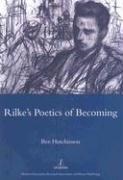Read more
Rainer Maria Rilke's early verse is often seen as having little relevance to the great achievement of the middle years, the Neue Gedichte. Yet the very different styles of the juvenilia and this new maturity are united by a preoccupation with processes of motion and growth which governs both his life and work. In this meticulous philological study, Ben Hutchinson reassesses every level of Rilke's early poetry, from its motives and metaphors to its very grammar and syntax, in order to trace what he terms a "poetics of becoming." With careful attention to rhythm, resonance and linguistic detail, he illuminates both the hidden patterns of the poetry and the artistic context of the fin-de-siecle. From its roots in the intellectual climate of the 1890s to the poems inspired by Rodin in 1908, Rilke's stylistic development is set against the surprising consistency with which he pursues this poetics of becoming.
List of contents
Introduction: 'Werden' and its Variants Part I 1. The Contemporary Climate 2. Juvenilia: 1893–1899 3. Der werdende Gott': Das Stunden-Buch and its Roots 4. Dingwerdung': Theoretical Transitions 5. Neue Gedichte: 'Linear' vs. 'Circular' Process Part II 6. Immer noch Entfalten um Entfalten': A Poetics of Deferral 7. Übergang: Beginnings and Ends 8. Conclusions
About the author
Ben Hutchinson
Summary
This book examines the intellectual climate as Rilke experienced it at the turn of the century. It draws on existing scholarship and the Rilke's own pronouncements in order to explore the major influences on the young Rilke's conception of processes of becoming.

